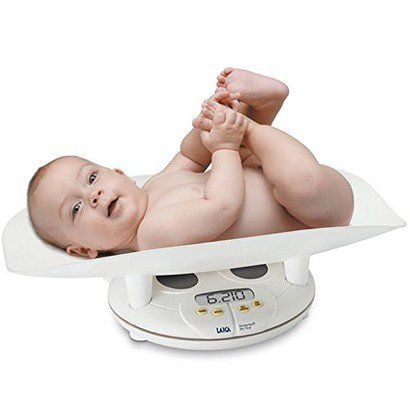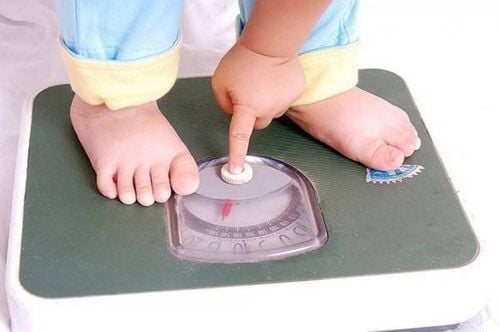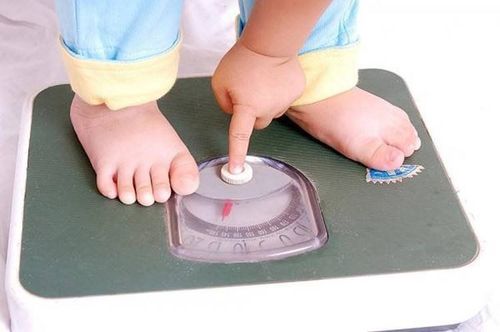This is an automatically translated article.
Not gaining weight does not mean that the child will always be shorter than usual and this depends on many different reasons. The following article will provide information related to the causes and ways to deal with not gaining weight in children.1. Should I be worried when my child is not gaining weight quickly?
You should not be too worried if you notice that your baby is not gaining weight as usual, instead you should maintain a monitoring of the child's growth chart. Remember, while your child should be gaining weight steadily, there are exceptions and even a little weight loss as your child adjusts to a new routine. Your baby's growth is not always a completely smooth process as at some point the rate of your baby's growth will slow down and maybe even stop temporarily. However, if the concern that your baby is not gaining enough weight persists in you, then talk to your doctor for the necessary advice and support.
Để tìm hiểu nguyên nhân tại sao trẻ không tăng cân hoặc chậm tăng cân, bác sĩ sẽ tiến hành khám sức khỏe cho trẻ
2. Newborn baby does not gain weight what to do?
To find out why your baby isn't gaining weight or isn't gaining weight slowly, the doctor will do a physical exam and find out more information about the child's growth rate and other factors to assess the condition. If your baby hits the right developmental milestones at the right time, and she's still feeling happy and healthy, her health is fine.However, if your child is not growing at a healthy rate, the doctor may diagnose the child as "not gaining weight" or "not growing". The criteria used to make this diagnosis may include:
Child's weight falls below the third percentile on the growth chart Weight is 20% less than ideal weight for height Weight down two or more major percentiles on the growth chart since the last check. Although failure to gain weight can happen to all babies, premature babies have a higher risk of not gaining weight than full-term babies. To find the cause, the doctor may also run blood, urine, or other tests and monitor your baby's calorie intake over a period of time. Your doctor may also observe how you breastfeed or bottle-feed your baby to see how your baby's jaw works. In some cases, your doctor may refer your baby to a pediatric gastroenterologist or to specialists nutritionist for evaluation and treatment.
Baby not gaining weight can be a concern for you, but it's important that you don't blame yourself or feel like you're not a good parent in raising your child. Besides, maintaining a reasonable diet, especially in the first three years is very important for the brain and physical development of children.

Không tăng cân không có nghĩa là trẻ sẽ luôn thấp bé hơn bình thường và tình trạng này còn phụ thuộc vào nhiều nguyên nhân khác nhau
3. Reasons why babies don't gain weight
To determine the potential cause of a child's lack of weight gain, the doctor may spend a lot of time performing an evaluation, such as performing tests, studying the diet, taking a medical history, and performing a physical exam. children's health and activity levels.If the child is not growing steadily, it means that the child is not eating well or not absorbing nutrients properly. Here are some reasons why this could happen:
Root cause of feeding problem:
Baby may be constantly tired and fall asleep before getting enough milk. Babies may have a weak sucking reflex that prevents them from getting enough milk from the mother's breast. A cleft lip or palate will interfere with feeding. However, these conditions are addressed with special bottle and nipple feeding and the help of lactation specialists. Having thrush can prevent your baby from sucking well and not getting all the nutrients he needs. If your baby is formula-fed, improperly mixing the formula can lead to failure to gain weight. Having trouble latching on and having trouble following a feeding routine can also cause your baby not to eat enough. In addition, it is possible that the mother's breasts are not producing enough milk to feed the baby. Breast milk is always available to the body and when breastfeeding begins, the body instinctively releases the hormone oxytocin, which stimulates the flow of milk. Stress causes this reflex to prevent the baby from breastfeeding. When this problem becomes chronic, it can lead to the child's inability to gain weight. Therefore, you should form a let-go reflex, trying to find a relaxing place to breastfeed. Feeding on a strict schedule instead of on demand can cause babies to receive less nutrition than they need. Most experts believe it's best to let babies breastfeed or bottle-feed for as long as they want. Other common causes:
If a child is sick, their body may need more calories and nutrients. Medical conditions can also affect a child's appetite. Children may have chronic gastrointestinal problems such as diarrhea, reflux, celiac disease, or milk intolerance. Postpartum depression prevents moms from giving their babies the attention they need to make sure they're getting enough calories. In rare cases, not gaining weight can be the result of certain lung problems, nervous system problems, chromosomal problems, heart problems, anemia, or metabolic disorders. or endocrine.
4. Treatment of children not gaining weight
Once the cause of the problem has been found, the doctor will begin to correct it by treating the cause and increasing the child's calorie intake, if needed. To return to a healthy weight, babies need to be supplemented with breast milk, supplemented with formula or started on solid foods. Babies need more high-calorie foods and when they're old enough, you should choose whole milk products like cottage cheese, cottage cheese, yogurt, ice cream and pudding (but stop giving them cow's milk until 1 year), eggs, butter, wholemeal bread and pasta, pancakes, mashed potatoes and hot cereals.In severe cases, a child who is not gaining weight may need to be hospitalized for intravenous infusion and close monitoring.

Để trở lại cân nặng hợp lý, trẻ cần được bổ sung sữa mẹ, bổ sung sữa công thức hoặc cho trẻ bắt đầu ăn dặm
5. How do I know my child has had enough?
If your baby is under 3 months old and is exclusively breastfed, you will know he is getting enough milk through the following signs:Your baby will have to change six to eight cloth diapers a day. Your baby has several bowel movements a day and the stools are mustard-colored for the first month. After the first month, your baby may have fewer bowel movements. As your baby suckles, you can see him move his jaw and hear him suck and even hear swallowing. Your breasts will become softer after breastfeeding than before. Newborns gain about an ounce per day for the first three months. After that, there is an increase of about 0.5 - 0.6 ounces a day up to 6 months and 0.4 ounces a day for babies 6 to 9 months and 0.3 - 0.4 ounces a day for babies newborns from 9 to 12 months. If your baby tends to be drowsy during feedings, keep them awake during feedings by gently tickling their feet, undressing them, changing diapers before or between feedings, engaging them in a Some games, have your baby sit up straight to burp as you move from one breast to the other.
If the baby doesn't finish on both breasts, perform pumping so you can maintain milk production. If you are concerned about your child's weight or food consumption between scheduled visits, weigh him or her once a week. For accuracy, make sure you always use the same scale. While breastfeeding isn't always the best option for all mothers and babies, if you're contemplating switching to formula, ask your doctor for more.
Not gaining weight does not mean that the child will always be shorter than usual because this condition depends on the underlying cause of the slow weight gain. For example, if a child has a long-term medical condition, he or she will probably always be below average. On the other hand, if a child has a problem relatively easily, he or she can catch up by growing faster than usual for a period of time.
In the case of children with prolonged slow weight gain, malabsorption, growth retardation, parents should supplement their children with supportive products containing lysine, essential micro-minerals and vitamins such as zinc, chromium, selenium, B vitamins help meet the nutritional needs of children. At the same time, these essential vitamins also support digestion, enhance nutrient absorption, help improve anorexia, and help children eat well. Parents can simultaneously apply dietary supplements and functional foods derived from nature for easy absorption. The most important thing is that improving your baby's symptoms often takes a long time. The combination of many types of functional foods at the same time or continuously changing many types in a short time can cause the baby's digestive system not to adapt and completely not good. Therefore, parents must be really persistent with their children and regularly visit the website vimec.com to update useful baby care information.
Reference source: babycenter.com













